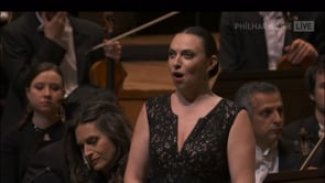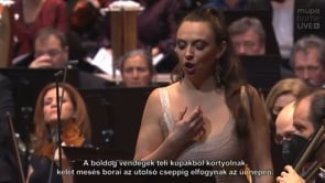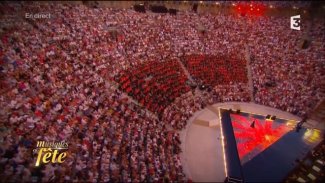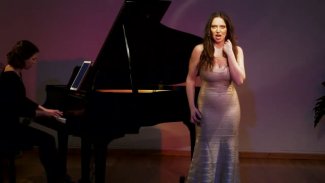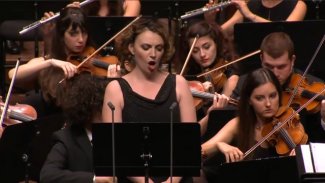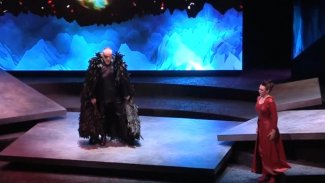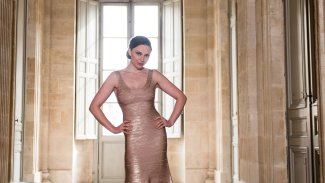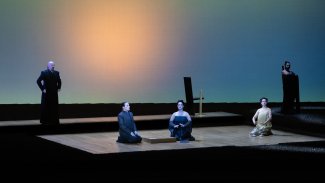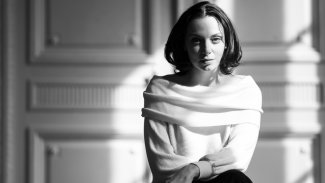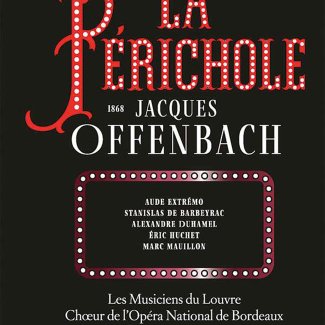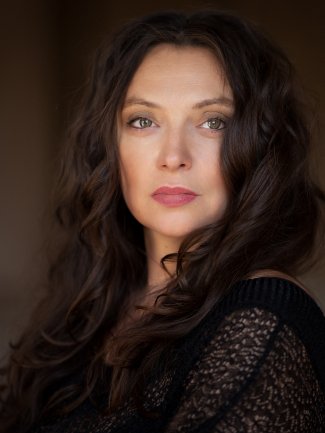
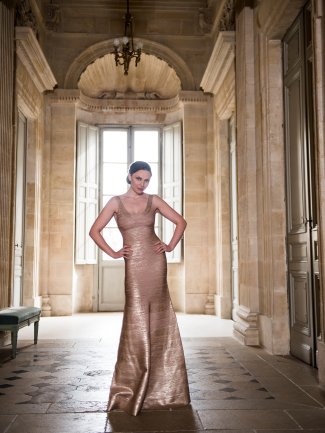
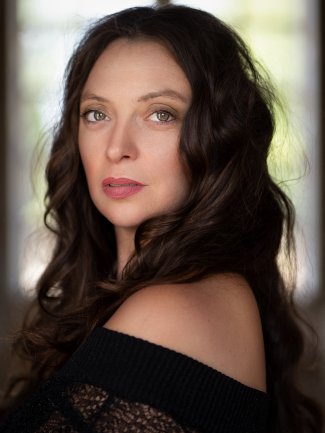
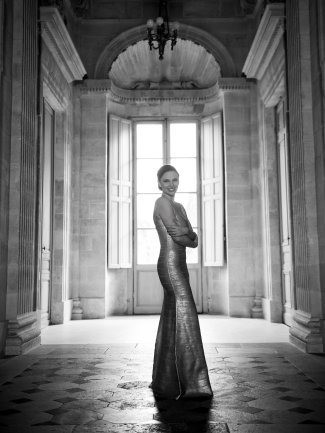
Aude Extrémo
Links
Download Assets
“But the revelation is undoubtedly Aude Extrémo’s Azucena, absolutely prodigious in intensity, with a vocal amplitude that seems limitless, flawless, and with a rare dramatic and scenic investment”
Premiere Loge, June 2025
Noted for her dark, opulent timbre and magnetic stage presence, Mezzo-soprano Aude Extrémo has emerged as a formidable force in the dramatic repertoire with a recent series of impressive debuts attracting critical acclaim for emotionally vivid portrayals and limitless vocal stamina. Building her reputation as a Wagnerian voice of note, the last seasons have seen first performances as Fricka (Die Walküre) for Opéra national de Bordeaux and Opéra de Marseille, Brangäne (Tristan und Isolde) at Opéra national de Lorraine, and Erda in Siegfried for Theater Dortmund and in Das Rheingold with Guanghzhou Symphony Orchestra. Her debut as Azucena last season in Louis Désiré’s new production of Il trovatore for Opéra de Marseille under Michele Spotti was universally acclaimed as was her Judith (Bluebeard’s Castle) for Opéra de Dijon under Kristiina Poska, and her performances as Maddalena (Rigoletto) and Suzuki (Madama Butterfly) for Opéra National de Paris highlighted her capacity to deliver dramatic commitment and flawless vocal line.
A laureate of Atelier Lyrique at Opéra national de Paris, Extrémo excels in French repertoire and was hailed “the Carmen of her generation” after performances at Opéra national de Bordeaux under Marc Minkowski. Further successes include Dalila (Samson et Dalila) at Opéra national de Bordeaux, Charlotte (Werther) with l’Orchestre Symphonique d’Aquitaine, Marguerite (La damnation de Faust) under Kazuki Yamada for Opéra de Monte Carlo, both Ursule (Béatrice et Bénédict) and Anna (Les Troyens) under Philippe Jordan at Opéra National de Paris, Concepcion (L’heure Espagnole) for Opéra de Tours, and Catherine in Roméo Castellucci’s staging of Jeanne d’Arc au bûcher at La Monnaie under Kazushi Ono.
See more
In the upcoming season Extrémo sings Sélysette in Àlex Ollé’s new production of Ariane et Barbe-Bleue for Teatro Real under Pinchas Steinberg, as well as reprising her tour-de-force portrayal of Yamina in Augusta Holmès’ La Montagne Noire for Opéra National de Bordeaux both in performance and recording for future release. Extrémo will also debut at the Macau International Festival as Carmen and embark on tour as the title role in Orlando with Les Musiciens du Louvre under Marc Minkowski in Paris, Valencia and Barcelona.
An engaging concert performer, recent highlights have included Verdi, Messa da Requiem with Royal Liverpool Philharmonic Orchestra under Domingo Hindoyan, Orchestre de Paris under Jaap van Zweden, and Orchestre national du Capitole de Toulouse under Jukka-Pekka Saraste. An innate interpreter of Mahler, Aude Extrémo expands her repertoire with first performances of his Symphony No.2 this season with Orchestre Philharmonique de Marseille under Michele Spotti, as well as returning to Lieder eines Fahrenden Gesellen with Orchestre national Avignon Provence under Debora Waldman. Elsewhere Aude joins Chœur de Radio France for Clémence de Grandval’s Stabat Mater – recorded for France Musique – and the Hungarian National Philharmonic Orchestra for Massenet, La Vierge under György Vashegyi.
Contacts
Shirley Thomson Senior Director, VOICE at HarrisonParrott | Head of CSR Phaedra Mylona Artist Coordinator / Administrator
General Management
Phaedra Mylona Artist Coordinator / Administrator
Phaedra Mylona Artist Coordinator / Administrator
General Management
Gallery
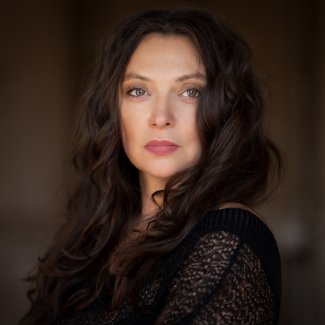
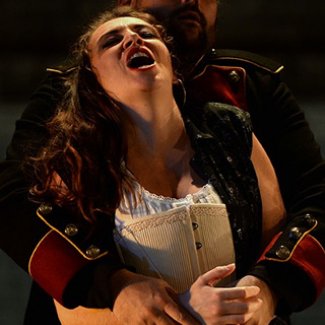
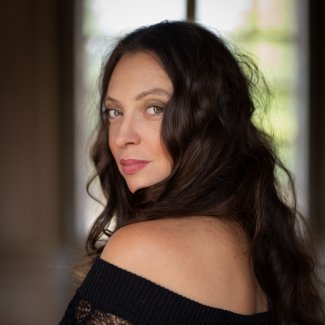
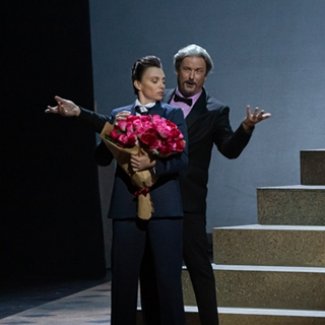

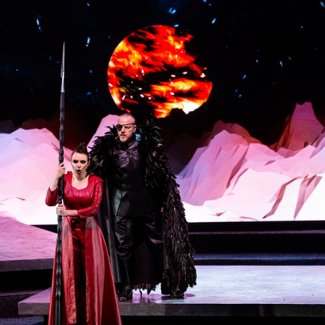
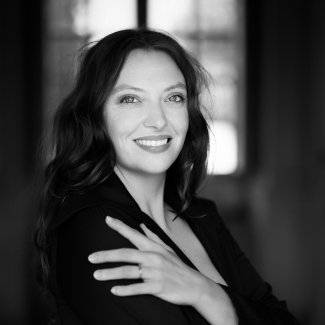
“The mezzo Aude Extrémo, as Selyssette, the singing voice of the captives, replaces the presence of the wet nurse with a very successful balance between bravery and submission.”
“But the revelation of this revival is undoubtedly Aude Extrémo’s Azucena, absolutely prodigious in intensity, with a vocal amplitude that seems limitless, flawless, and with a rare dramatic and scenic investment: she literally plays an anthology Azucena.”
“Aude Extrémo commits body and soul to this contrasting role, giving the singing line the vivid intensity of guilt, the desire for revenge and the passage through traumatic ordeals. Her long, enduring and shimmering voice is like the long red scarf she wears, a phantom umbilical cord that she never leaves.”
“Vocally, it is difficult to offer a more homogeneous cast even if, by level of applause, Aude Extrémo finishes on the first step of the podium; and in a deserved way. Her interpretation of Azucena is breathtakingly intense… the mezzo succeeds in a performance that brings tears to the eyes as her emotion is palpable, the backbone of a low, powerful, limpid, hallucinatory song without falling into pathos.”
“Judith is Aude Extrémo, a role now taken up by this mezzo at the right time in her career. The voice knows how to be caressing, imploring and voluntary as well as imperious, always intelligible… A great actress as well as a great voice.”
“Aude Extrémo stands out in Judith by an energetic and warm timbre, opposed to that of Bluebeard. Her voice advances poetically towards the growing anguish, translating the oxymoronic intensity of drama and light as she opens the doors.”
“with the coppery timbre of Aude Extremo whose sumptuous, ample, sensual and bewitching voice gives a rare relief to her superlative Maddalena, a character too often unjustly neglected in casts.”
And it is the performance of the French mezzo-soprano Aude Extrémo (Yamina) that dominates the vocal stage, if only because of the quality of her diction, which is far superior to that of the other performers. But our admiration for her incarnation goes far beyond that: the singing, first of all, is perfect, round treble, delicate, chiselled, sovereign, rich in harmonics and powerful lows, legato, rubato, crescendos; Aude Extrémo masters all the technical difficulties on the entire tessitura, without ever letting herself be covered by the orchestra or the choirs and without ever forcing her beautiful timbre. Since, in addition, she is perfectly at ease on stage and dances with elegance and grace, she gives her character an unforgettable depth and the role of Yamina will remain marked for a long time with her seal, she who was able to bring it back to life with so much strength of conviction.
“The production is dominated by Aude Extrémo’s staggering embodiment of the role of Yamina… The French mezzo-soprano makes short work of the difficulties of the role and launches with the same aplomb through darting highs and bewitching lows. The expression is of great refinement in the more lyrical passages and the singer’s particular timbre gives a striking and magnetic colour to the character of Yamina, all the more so as she inhabits the stage with undeniable strength. The only French-speaking member of the cast, she is also the only soloist we understand without difficulty.”
“In front of him, the mezzo Aude Extrémo — who exploded in this same city six years ago in the role of Venus (Tannhauser) — offers a Marguerite of one of the darkest and most opulent French voices of the moment (alongside Clémentine Margaine). The impact and vocal seduction are undeniable”
“Aude Extrémo offers a sensitive Marguerite with voice full of colours and harmonics (without giving the impression of an overflow of vibrato).”
“Aude Extrémo has no difficulty filling every corner of the room with the immensity of her legato. As much with her presence as by her tone, her two arias, and in particular “Divinités du Styx”, leave the listener amazed by the breadth of her timbre, the fabric of its treble, and the mastery of its phrasing (enough to make you want to hear her as Strauss’ Die Amme or Wagner’s Erda).”
… “starting with Aude Extrémo, who undoubtedly deserves her surname… her voice evolves from low to high with the same breadth and generosity. It is surprisingly in a monumental “Divinity of the Styx” that she triumphs. Sensitive souls abstain, the gods of the Underworld have undoubtedly taken fright in front of such immensity and enthusiasm (Maestro even loses his baton), and the text is launched with lightning precision. Her voice is that of Rita Gorr with the bad-ass side of Shirley Verrett, and the sensuality of Anna Caterina Antonacci.”
Mezzo-soprano Aude Extrémo, with a voice like chocolate velvet, floated her high notes with intoxicating ease and swept majestically through her iconic solos.
‘… with a vocal freshness throughout the range, like the radiant Aude Extrémo (Fricka). The French mezzo finds here a role that is perfectly suited to her means, emphasizing the beauty of her timbre with astounding ease, as much as her powerful and admirably projected voice’.
“Distinguished from the team is Aude Extrémo’s Métella, with a great vocal and stage presence.”
“Aude Extrémo confirms that she is the Carmen of her generation: between her sumptuous voice and the intelligence of her interpretation, we are conquered by this proud and distinguished Carmen. So natural and touching that we can only fall in love.”
“For her part, Aude Extrémo confirms — if it was needed! — the immense Carmen that she is. Everything is perfectly in place: the voice, rich and deep, gives this mezzo-soprano all the means necessary to portray an extremely seductive, and at the same time vulnerable, Carmen. Her charisma and sensitivity make it possible to convey all the complexity of a character that is deeply bewitching but also sometimes tortured. Aude Extrémo also demonstrates her great comic strength, especially in the spoken passages.”
“Extrémo, auburn mane and golden ankle boots, sets the scene on fire as soon as she appears. The voice is rich, full-bodied, and opulent in the lower register.”
“Aude Extrémo masters all the facets of Carmen which she plays with a suicidal, casual, seductive, brutal, disdainful and sensual energy. Obviously, this “zingara” will never be tamed. The voice embraces the colours of the role, with ample and warm bass notes, hoarseness to portray Carmen’s animality, and airy trebles to recall her infinite freedom.”
“Beyond the intrinsic beauty of the timbre — its bass as opulent as its conquering highs, such phrasing and impeccable diction — she impresses by embodying the character with such naturalness, resolution and sensitivity that we can only love her; thus establishing herself as one of the best Carmen’s of the moment.”
“Aude Extrémo is easy to qualify: it is THE voice of Carmen.”
“There remains Aude Extrémo, who made her stage debut in the role. Well here she is, this Carmen that we all expect: freed from the traditional image of a vulgar whore, she dances with distinction, and fascinates with her distinguished movements and costume. The lioness temperament is there, the infantile and spontaneous character on occasion too, but tempered by the suffering of the abused woman who, disturbed by the fits of violence from her lover, seems to hesitate before finally choosing her fate. Her voice is of course part of the seduction which emanates from her, the treble of a brilliant and controlled instrument is an object of fascination, like the opulent and black bass which she never abuses, proportioning its effects in a bewitching habanera, a séguedille contained until the explosion, and a bewitching Card Air.”
“Aude Extrémo embodies a memorable creature; she pours, full throttle, the creamy and almost cavernous metal of her ample mezzo. One will rarely have listened to Carmen more domineering, more fatal… She is a weapon of massive seduction. When she sings, everything is erased in this vocal relief, this silk with infinite breath, both sensual and monstrous.”
“In the title role, Aude Extrémo confirms her place as the most exhilarating French mezzo of her generation (alongside Clémentine Margaine) thanks to her racy voice of an unusual magnitude, attached to a biting and endearing tone…her stage presence, all of determination, glorifies a Carmen who — assuming the consequences of her actions, without hesitation and without nostalgia — dares to live and love to the full.”
“Fricka often remains a secondary role but this scene…becomes epic when it is thus seized by a voice of such temper and of such a presence.”
“For her second excursion to Wagnerian lands (after Venus in the Parisian version of Tannhäuser in Monte Carlo), Aude Extrémo was a great success in Fricka. The voice is full, sonorous, skilfully projected even into the highest notes of the role and the character, skilfully portrayed, escapes the caricatural interpretations which sometimes reduce Fricka to a simple jealous and hysterical wife.”
“Beware of Fricka’s anger, since Aude Extrémo is burning the boards, outraged wife draped in the divine splendors of her opulent mezzo!”
“Her voice is deep, even guttural, her chest impressive, capable of captivating in the bass and blazing in the treble. In opera arias — Massenet and Saint-Saëns — she deploys her playing with intense dramatic expressiveness. ”
“In Amnéris, the French Aude Extrémo is the great revelation of the evening. What an interesting timbre, what flexibility in the voice, with a bass that allows her to embody both the roles of mezzo (the high register is clear) as those of contralto (her Bordeaux Dalila, last season, made an impression)! Her whole last act is of a very high standard.”
“Aude Extrémo (Venus, Tannhäuser), look-alike of Jean Harlow or Zsa Zsa Gabor, ineffable of vocal musical intelligence, deploys the most languid seductions and God, the influential melisms of the Paris version suit her well!”
